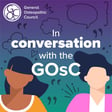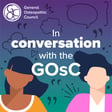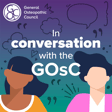Introduction to Values-Based Practice Discussion
00:00:07
Speaker
Hello and welcome to another GOsC podcast. I'm Steven Bettles, Head of Policy and Education. This recording is slightly different to others in the series, as it was recorded back in September 2018.
Development of Shared Care Resources
00:00:19
Speaker
It's a discussion with Professor Bill Fulford of the Collaborating Centre for Values-Based Practice in Health and Social Care, and the late and much-missed Professor Stephen Tyreman of the University College of Osteopathy, and explores the concepts of values-based practice, what this means and how it can be implemented in practice.
00:00:38
Speaker
Both Bill Fulford and Stephen Tyreman were instrumental in supporting us, developer and thinking in this area, in collaboration with osteopaths, patients, educators and others. And this led to the development of our resources to support osteopaths and patients to make decisions about care together, taking into account what's important to each of them. These are available on our website, the link for which will be in the show notes.
Honoring Stephen Tyreman in the Podcast
00:01:02
Speaker
I recall recording this conversation then and sadly I think it was the last time that I saw Stephen Tyreman before he died in November 2018.
Understanding Shared Decision-Making
00:01:10
Speaker
We're grateful to Stephen's family for allowing us to continue to use this recording and we hope that you find it helpful.
00:01:20
Speaker
Hello, this is Steven Bettles from the General Osteopathic Council. I'm joined by Professor Bill Fulford of the Collaborating Centre for ValuesBased Practise in Health and Social Care, and Professor Stephen Tyreman of the University College of Osteopathy to discuss some of the key issues around shared decisionmaking and values-based practice. ah So, Bill, what do we mean by shared decision-making?
00:01:40
Speaker
Well, shared decision making is really what it says on the tin. It is decision making about clinical care that is shared between the clinician and the patient. And it can take different forms, but there's been a lot of work looking at how clinicians and patients can be more collaborative in the way they come to decisions about individual treatment. So Stephen, where has work in this area come from?
00:02:06
Speaker
Well, it's developed from a number of sources, really. there's There's been a specific impetus from it in recent years, which Bill will talk about in a moment.
The Legal Framework of Shared Decision-Making
00:02:14
Speaker
But it's been regarded as a good practice for a long time, talking to patients, finding out what their needs are and seeing or ensuring that the treatment that we're going to give is is going to meet those needs.
00:02:26
Speaker
And why has this become an inherent part of healthcare, care particularly since the 2015 bill? So as Stephen said, there's been a particular impetus to this work from 2015, which was the date that a ah Supreme Court judgment on consent was was published. It's called the Montgomery Judgment. And essentially what the Montgomery Judgment did was to look at the regulation of practice and say, well,
00:02:54
Speaker
contemporary standards require shared decision making. So this judgment will make that a legal requirement as well as a regulatory requirement. But what the Supreme Court tried to do was to give a legal framework to what was established good practice. They weren't inventing some new legal standard It was very much about putting into a legal framework the standards of best practice. And our view in Oxford is that that very much means that that judgment, perhaps unusually among Supreme Court judgments, is a support to practitioners rather than a constraint. I can say a little bit more about what the judgment actually requires, or we can come back to that in a moment.
Consent and Patient Dialogue
00:03:34
Speaker
Well, well so say some more now. So the judgment said that consent to treatment requires
00:03:43
Speaker
and it was their term a dialogue between clinician and patient. And in that dialogue, the aim is that the patient comes to understand the reasonable options for treating their condition.
00:03:57
Speaker
and that what the risks and the benefits of those different options are. And the clinician comes to understand what those risks and benefits look like from the perspective of the individual patient. So in that sense, the patient's values. So if you think of it being a conversation about the evidence base for the options available for a particular treatment, and that's the clinician side of it, and how those options play out from the perspective of the individual patient, that's the patient's value
Implementing Values-Based Practice in Osteopathy
00:04:25
Speaker
side of it. So Montgomery is about shared decision making based on the one hand evidence on the other hand values.
00:04:32
Speaker
Stephen, you're an osteopath. So for an osteopath, how would adopting a values-based approach to shared decision-making impacts on their practice, is is it just what they're supposed to be doing already? In a sense, yes, it is what we're supposed to be doing. And many osteopaths would say, but I already do that. We have a patient-centered approach. We don't have a disease-centered approach. But it hasn't been as explicit as is made clear in values-based practice.
00:04:59
Speaker
One of the things that values-based practice does is to make you stop and think about what are the needs of this person who's who's sitting in front of me with their problem and how is my treatment going to support that or not or other things about this patient I actually don't know.
00:05:16
Speaker
I don't know much about their background and and what they think is valuable in their life and what they're aiming to do and is there a possibility that what I'm proposing or suggesting for them might have a detrimental effect on that. So it just gives time to reflect on who this person is, what their needs are, what what it is that they come to see me about and whether what I'm suggesting or what is available to them is going to meet those needs.
00:05:45
Speaker
So this is more than just telling patients about the risks of treatment? Yes, I think that's that's right. As Stephen says, it is a reflective process. I'd perhaps want to emphasise a bit more than Stephen, again, the word dialogue, that it isn't just the clinician reflecting about what's appropriate for this particular patient. It's actually engaging in dialogue. The Supreme Court judgment uses the word dialogue. It also uses the word conversation. It's integral to the model of consent that's built into the Montgomery ruling, is that there is that dialogue.
00:06:18
Speaker
And it's a dialogue about benefits as well as risks. And it's a dialogue about the range of options available, the range of reasonable options. I think the lawyers, of course, use a phrase like non-futile. But what it means is that you're not obliged to discuss you know any weird option that somebody might have read about in a daily paper. But all the reasonable options from your perspective as a professional and that the patient is likely to be concerned about. So it's a range of options, the risks and benefits, and then it through dialogue coming to understand how those risks and benefits weigh in the balance for that particular patient, and as Stephen says, that particular patient's needs and preferences.
Efficiency of Values-Based Practice
00:06:59
Speaker
So do practitioners find that the type of dialogue you've mentioned takes out more time in patient consultations? To a small extent, yes, but not in a major way. I think I'll spend a lot of time talking to patients anyway and This is just an extension of that and and making sure the focus is on ensuring you know the person. They have their their opportunity to say what's important to them and have a chance to respond to what you say as well as part of the dialogue that goes with it. So there's not so much that it takes more time. It perhaps again just focuses the way we use the time that we have in any case. So I would agree with that. I think the the mantra is work smarter not harder.
00:07:44
Speaker
And the area we've been working in, particularly in Oxford, is surgery. And my colleague at the Collaborative Centre, Ashok Hander, who's the co-director of it, is a vascular surgeon. And his anecdotal evidence is that he sees just as many patients in his outpatient clinic.
00:08:02
Speaker
as he was seeing before. And his impression, although we don't we don't have actual evidence for this, but his impression is that it saves time down the road because there's much more engagement with the patient in the treatment choice. So you can actually save time overall.
Accessing Resources for Continued Learning
00:08:18
Speaker
Where can we find out more information and support on shared decision making and values-based practice? So for the values-based practice, the the Collaborating Centre in Oxford, the website is very simple. It's just values-based practice. It's valuespluralbasedpractice, all one word, dot .org, O-R-G. And there's a Contact Us button on that website. It comes up in the right-hand column of every page.
00:08:43
Speaker
There's a lot of information on the website. If you have a particular query or want to get more involved, just go come through the Contact Us button and we'll get back to you. Yeah, and Bill and I have been working with the GOsC for the past four or five years now um and developing both ideas and a range of resources that's from the GOsC website is is available to to practitioners to support this kind of thinking. Okay, Bill, thank you very much.



